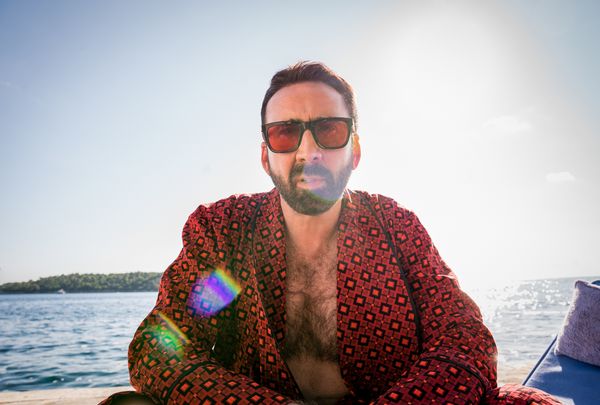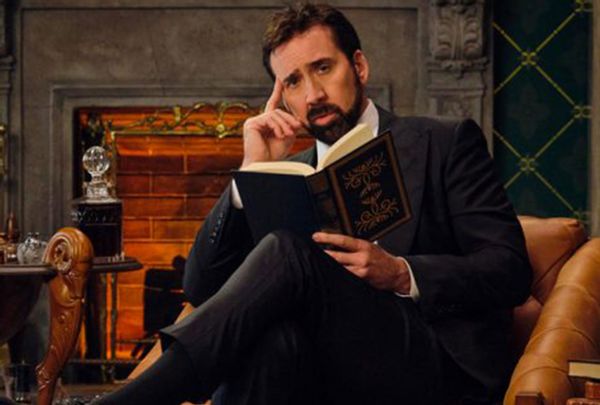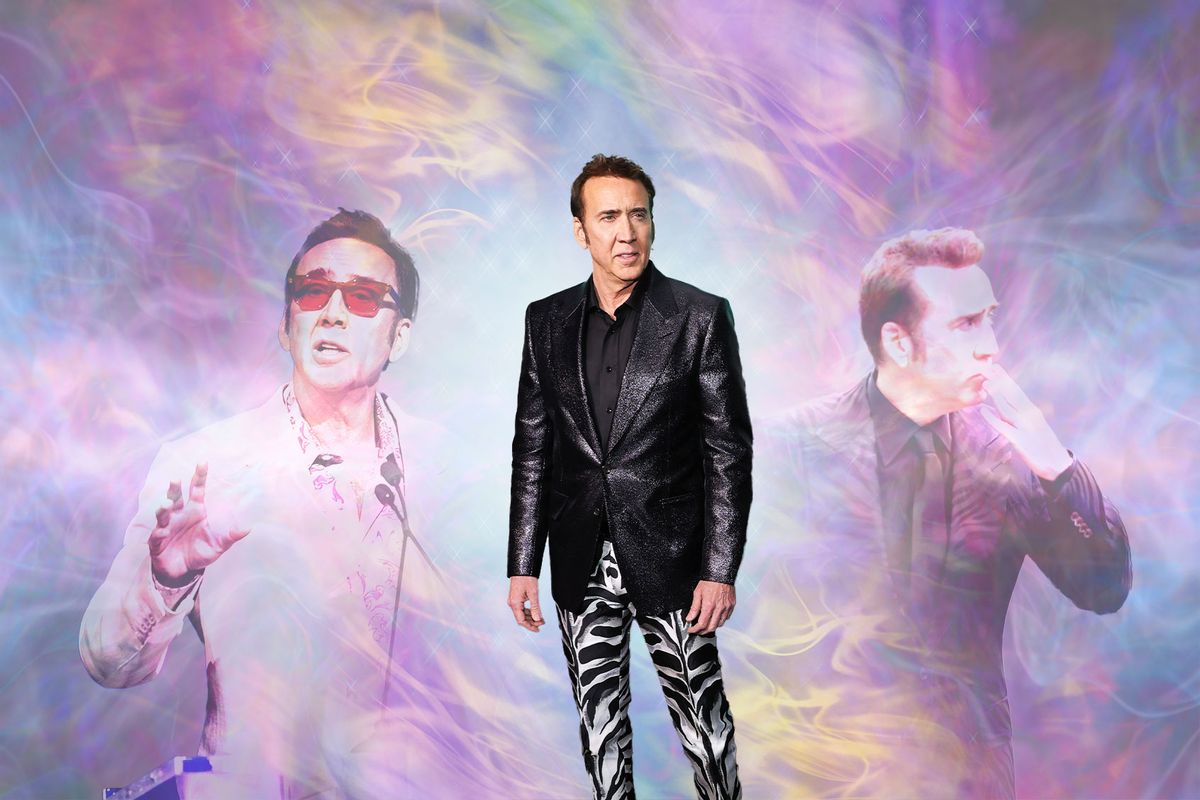Nicolas Cage knows he occupies real estate in your head. Maybe it’s the size of a closet. Maybe it’s a mansion or a townhouse. Maybe your brain is Planet Nicolas Cage. He knows he’s in there somewhere.
This is inferred, not specified, during our recent conversation about “Dream Scenario,” his latest film, and, if it were up to him, his "adios" to cinema. Cage invokes the Spanish “goodbye” a few times within the 20 minutes allotted for our talk, unprompted, as he has with other reporters to whom he’s spoken about his starring role in Kristoffer Borgli’s surreal fantasy about viral fame.
“Dream Scenario” casts Cage as Paul Matthews, a mild-mannered evolutionary biologist and tenured college professor who suddenly pops up in the dreams of people he’s never met. This unexplained phenomenon makes Paul famous overnight, which he tries to use to launch his academic theories into the public sphere. But fame is fickle, and Paul quickly transforms from a delightful curiosity into a person nobody wants around, and for reasons he can’t control.
One might understand the desire to ask Cage for his own perspective on what it feels like, given that he is one of the most recognizable people on Earth. All Cage would say during a recent Zoom conversation, referring to his latest role is “I did see, not that it was meta, but I did see how I could apply my own experience.”
By this, he’s referring to the real-life memeification of his likeness and his personality, the most relatable parallel he sees between his life and the “Dream Scenario” plot.
Placing this quote in full context, I had told him that I watched “Dream Scenario” back-to-back with “The Unbearable Weight of Massive Talent,” the oddball action comedy in which he plays a version of himself who is dying for a comeback.
Very different movies, Cage reminds me — “Massive Talent” was written for him while “Dream Scenario” was not. That may be, but in some sense they are in conversation with each other, which Cage acknowledges.
"I was interested in film performance. Well, then along came the Internet."
“When I decided to be a screen actor back in the early '80s, we didn't have the internet. We didn't have the viral memes that have since emerged,” he explained. “I signed up to do movies that I had hoped would even begin to approach the great movie stars that I grew up with and admired — movies like ‘Midnight Cowboy’ and or you know, James Dean in 'East of Eden.' Or Marlon Brando or Bette Davis. So that's what I was interested in. I was interested in film performance.
“Well, then along came the internet,” he continued, “and along came what I have since coined my memeification where it was folks online cherry-picking specifically the meltdown moments, the so-called ‘Cage Rage’ moments which kind of developed this idea that I was a maximalist.”
The truth in that was affirmed after our chat when, in separate interactions with friends, mentioning that I had interviewed him elicited virtually the same question: “Is he weird?”
Not at all. But this brings us to something else Nicolas Cage is aware of, which is a) he is Nicolas Effin’ Cage, and b) that means something different to various generations of moviegoers. There's no arrogance in this, merely acknowledgement that depending on what you’ve seen of a filmography that spans four decades and has touched nearly every genre, he could be anything to you.
His co-starring roles in two 1987 classics – Joel and Ethan Coen’s “Raising Arizona” and Norman Jewison's rom-com “Moonstruck” – concurrently established his facility with comedy and his appeal as a romantic lead. He entered the '90s starring in David Lynch's "Wild at Heart" before toplining commercial action blockbusters including “Con Air” and “Face/Off.” These, and the “National Treasure” movies, marked him as a bankable hero through the ‘90s and aughts. And in these same decades, he earned a best actor Oscar for his performance in 1996 “Leaving Las Vegas” and a nomination for his outstanding work in 2003’s “Adaptation.”
It is equally as likely that younger audiences associate him with his numerous direct-to-video releases and other smaller features, part of a slew of work undertaken to repay massive debts owed to the I.R.S. along with the liquidation of many properties he purchased over the years. At one point, Cage owned two castles – one in Germany and another in England – as well as a dinosaur skull.
These details are not drawn from our chat but borrowed from the small Nicolas Cage Museum of Natural History in my brain. To that collection he adds clarifying phrases related to his filmography. “Massive Talent” jokes about this by having the fictional Nic Cage describe his performance style as “nouveau shamanism.” With me, he cites his minimalist performances like his acclaimed turn in “Pig” and refers to channeling German expressionism for “Vampire's Kiss,” both of which are in service of “playing what could be done with film performance and not just getting stuck in kind of ad infinitum interpretation of 1970s naturalism.”
 Nicolas Cage in "The Unbearable Weight of Massive Talent" (Katalin Vermes/Lionsgate)In reality, the actor takes his approach quite seriously, citing his source material as professorially as Paul Matthews would. The actor’s fans have no doubt heard him talk about the way his tragic outburst in “Moonstruck” was inspired by a moment in Fritz Lang’s “Metropolis,” or that he drew from James Cagney’s mien for the prison fight scene “Face/Off.”
Nicolas Cage in "The Unbearable Weight of Massive Talent" (Katalin Vermes/Lionsgate)In reality, the actor takes his approach quite seriously, citing his source material as professorially as Paul Matthews would. The actor’s fans have no doubt heard him talk about the way his tragic outburst in “Moonstruck” was inspired by a moment in Fritz Lang’s “Metropolis,” or that he drew from James Cagney’s mien for the prison fight scene “Face/Off.”
All that effort was overpowered for a time by endless “Cage Rage” memes and videos.
We need your help to stay independent
He says he discovered them for the first time back in 2008 or 2009, when “I stupidly Googled my name, which I don't recommend. That's my New Year's resolution, is not to Google my name anymore.”
The search yielded a barrage of cherry-picked scenes of Cage, in an assortment of roles, freaking out. There he was screaming the alphabet in “Vampire’s Kiss,” or yelling about the misery of losing his hand, and his bride, in “Moonstruck.” Andy Samberg began lampooning him on “Saturday Night Live.”
"It was an adjustment. I had to become friends with [memeification] ... because I think it kept me in the conversation."
“I was bewildered and trying to process what was happening to me with these viral mashups,” Cage admits, “Like, ‘Nicolas Cage loses his s**t.' There was no reference point. And so I had to put those feelings of frustration and confusion and stimulation somewhere, you know. I like to turn lead into gold.”
He sees “Dream Scenario” as one place to put that, “although no one was really thinking about when they cast me. It was my own private understanding of how I wanted to play Paul Matthews and what I could bring.”
“But you bring up an interesting point,” he concedes, “which is that now we can all experience notoriety and infamy. Another advent that happened after I decided to be a film actor is that everyone now has a cell phone. Everyone has a video camera and their cell phones and everyone can videotape somebody on an airplane having a meltdown.
He concludes, "I think that's what Kristoffer was really talking about, how the speed of the viral image is so fast, that it becomes almost like a collective unconsciousness, like what Jung was talking about.”
As for becoming a famous meme subject, "I am not upset about it. It was an adjustment," Cage admits. "I had to become friends with it, and I subsequently have because I think it kept me in the conversation. I don't think 'Unbearable Weight of Massive Talent' would have happened if that didn't happen to me."
Conversations circling around metatextuality demand some disclosure, in that any journalist speaking to a celebrity knows they are part of a food chain. The studio and the star have a message they wish to broadcast. In talking with someone like Nicolas Cage, then, regardless of your questions, they will ensure their talking points are covered.
One is that adjacent to that previously mentioned “adios,” Cage is on the verge of 60, making him ready for a new challenge.
“My dad died at 75, and that was a long time ago, but I'm doing the math,” he said. “I'm thinking, OK, let's get as I'll do as much as I can now because I really want to take stock and what's important in the next 15 years. If I'm lucky enough to live longer than 75, great. But you know, I'm going to see how I'm going to spend my next 15 years.”
What he means is, “I am excited about the potential of television."
Want a daily wrap-up of all the news and commentary Salon has to offer? Subscribe to our morning newsletter, Crash Course.
Cage called “Dream Scenario” a masterpiece, saying he’d be thrilled to go out on a high note like that. But he has other commitments before he can leave cinema behind. “I've made over 100 movies now. I've lost count,” he said. “I think I've said what I've had to say. Let's try something else.”
Five of those movies – six, if you count his digitally rendered cameo as an alternate universe’s Superman in “The Flash,” came out this year. Cage calls this hectic release parade a “logjam” created by COVID-19 delaying production along with this summer’s WGA and SAG-AFTRA strikes. The pacing was more along the lines of two or three films a year, which is still quite a bit and establishes he has the type of stamina that series entertainment demands.
Cage views TV’s possibility from another angle. “My son got me into ‘Breaking Bad,’ and I was enamored with Bryan Cranston as he's staring at a suitcase for one entire episode,” he said. “And I'm like, we don't have time to do that in feature films. This would be a new experience.”
 Nicolas Cage in "The History of Swear Words" (Netflix)For Cage, sure — his role in Netflix's “The History of Swear Words" notwithstanding. But not necessarily for people who have enjoyed his more recent, quieter performances. Like the mournful chef who has withdrawn from society in revenge thriller “Pig,” in which he has the least lines and takes beatings instead of doling them out. Or “Dream Scenario,” where the world squashes his professor, who is already feeling small and useless, into something infinitely flatter after inflating his ego for a brief time. TV is a performer’s medium, as many longtime film stars have come to realize. There is room for maximalism and minimalism. There is more than enough space for Nicolas Cage, whichever versions he chooses to manifest for that new medium.
Nicolas Cage in "The History of Swear Words" (Netflix)For Cage, sure — his role in Netflix's “The History of Swear Words" notwithstanding. But not necessarily for people who have enjoyed his more recent, quieter performances. Like the mournful chef who has withdrawn from society in revenge thriller “Pig,” in which he has the least lines and takes beatings instead of doling them out. Or “Dream Scenario,” where the world squashes his professor, who is already feeling small and useless, into something infinitely flatter after inflating his ego for a brief time. TV is a performer’s medium, as many longtime film stars have come to realize. There is room for maximalism and minimalism. There is more than enough space for Nicolas Cage, whichever versions he chooses to manifest for that new medium.
“We'll see if that happens,” he tells me, a note of humility tethering his confidence to Earth. “I don't know. We'll see.”
"Dream Scenario" is currently in theaters.
Read more
about Nicolas Cage

Shares